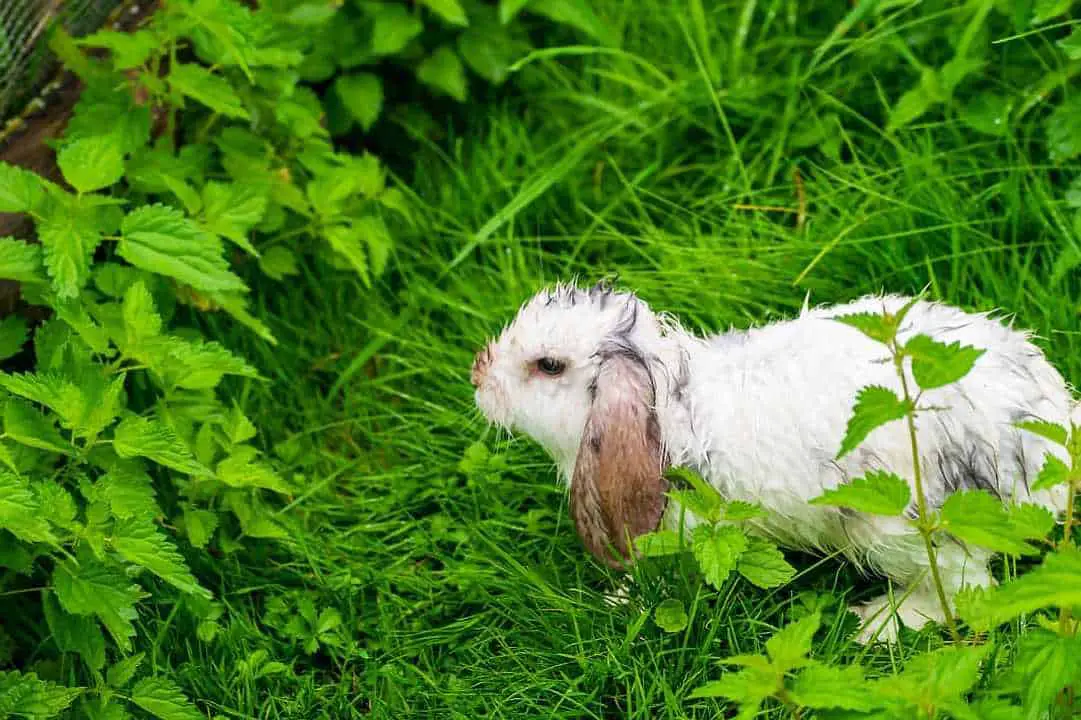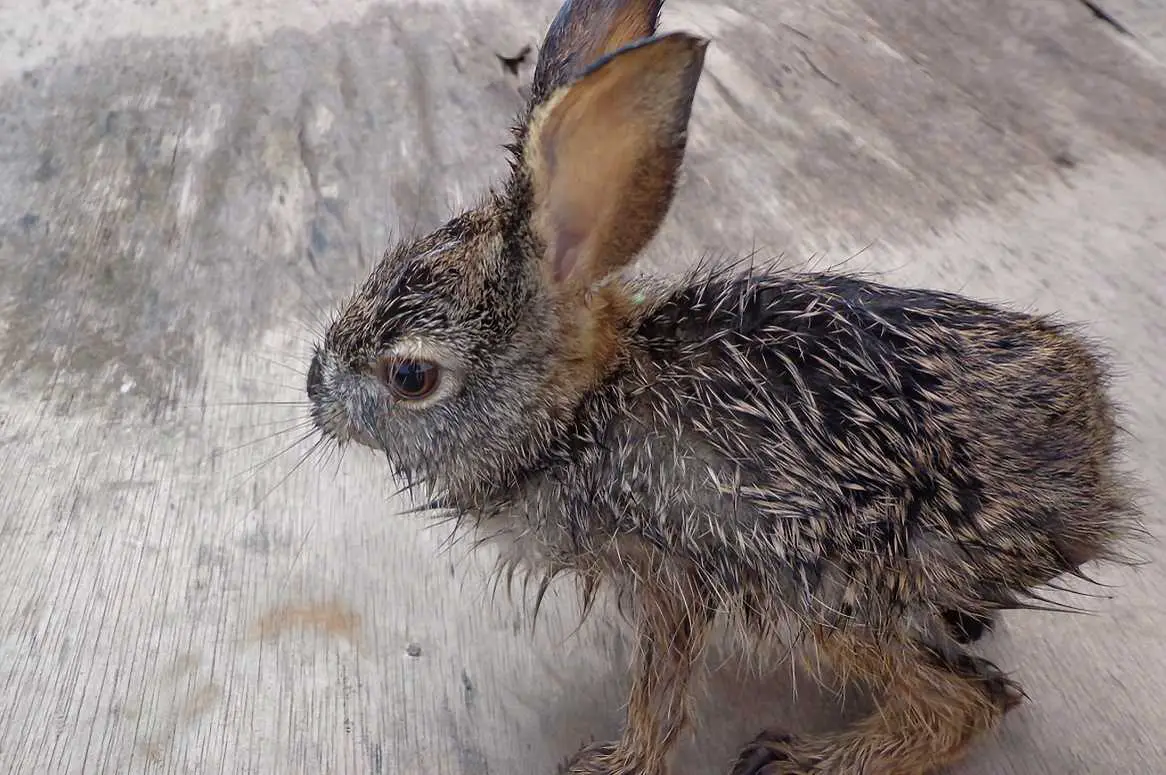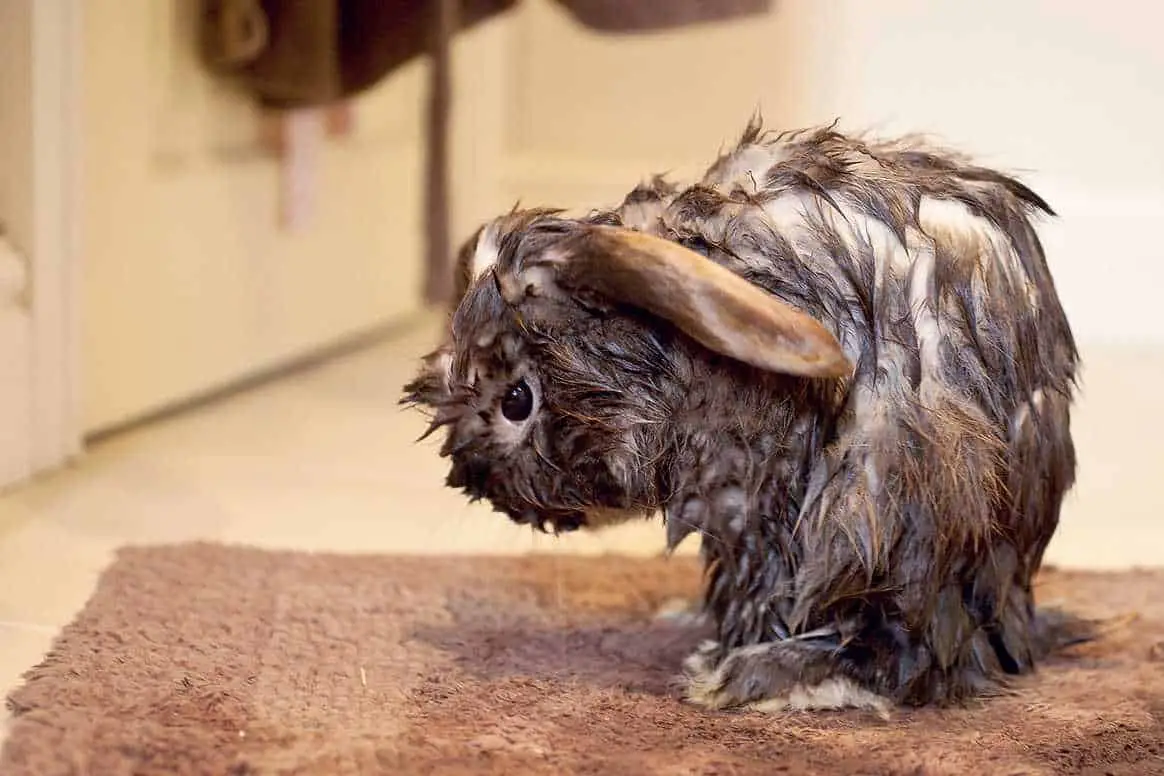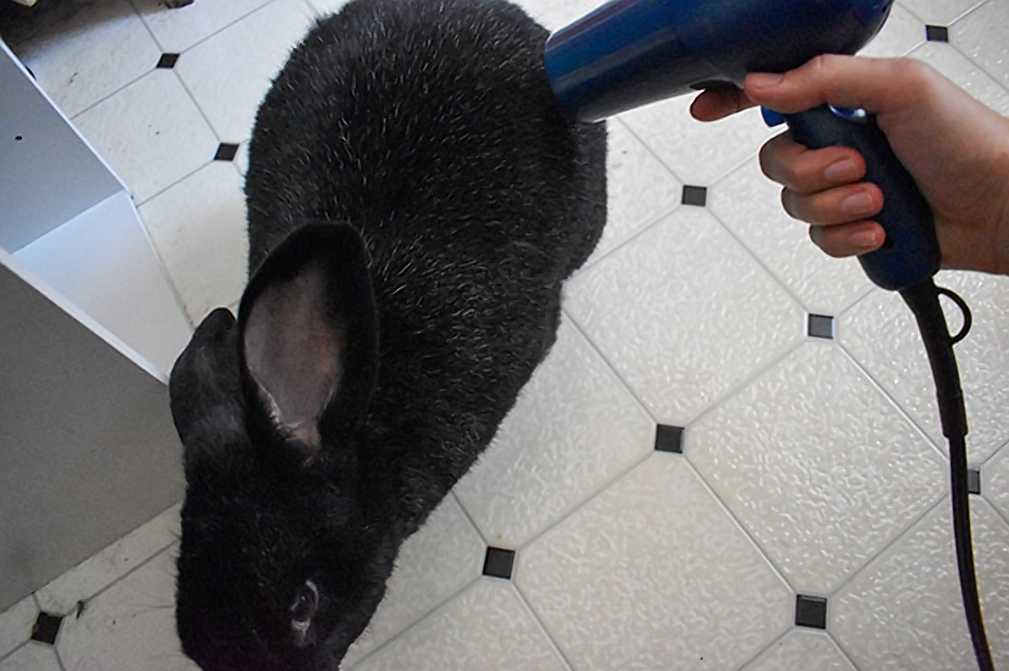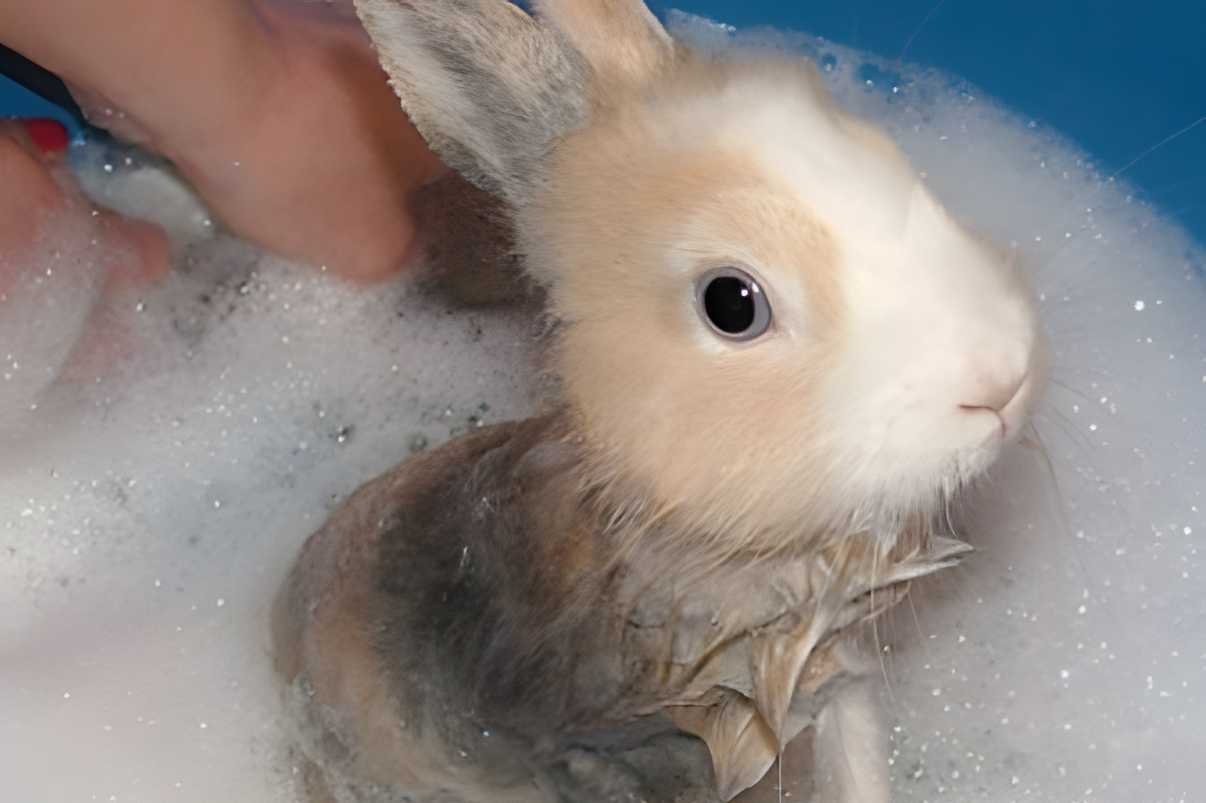Can rabbits get wet? Do they enjoy being near water? If you own a pet rabbit, you should know what is and is not safe. You might have heard rumors that your rabbit might die when it gets wet. What should you do if the rain soaks your beloved bunny?
Should rabbits get wet?
As a general rule, rabbits shouldn’t get wet. However, there are some exemptions. There’s also a significant difference between a damp and a soaked rabbit. The former is entirely harmless and will dry soon, whereas the latter is far more likely to cause harm.
Bunnies aren’t supposed to get wet in the first place. Their fur resists water droplets to preserve their delicate skin. If you force rabbits to take a bath, they will retaliate with bites, kicks, bites, and other tactics to flee. These actions alone can injure your bunny. They are also aware that water will harm them.
However, rabbits tend to soil themselves, which can be tough to clean up. The most common causes are arthritis, obesity, and old age. At times, the dirt is in a difficult-to-reach location. A rabbit-safe bath is required at these times.
Therefore, always exercise caution while administering any water to your bunnies. Never wholly soak them. Also, do not leave your rabbit outside in the rain. Ascertain that it has access to shelter and that it is staying dry. It’s imperative to keep it inside at this time.
The idea is to keep as little of your bunny as moist as possible. You don’t want anything other than its back and back legs to become wet.
Do rabbits get sick if they get wet?
When rabbits get entirely soaked, they are in excruciating pain. They will fight tooth and nail to avoid it. Getting wet can make your bunny sick and a slew of additional dangers. Water is not as deadly to rabbits as many people believe. However, a wholly drenched rabbit has profound implications, especially for an extended period.
The following are some of the health risks linked with a damp rabbit:
- Hypothermia: The primary danger with soaked rabbits is that they may become hypothermic. Since they don’t dry rapidly, their body temperature might soon drop below safe levels. This condition puts them in danger. Hypothermia can be fatal rapidly, so make sure your rabbit is well cared for.
- Skin Infection: Rabbits’ skin is susceptible to skin irritation or infection. Their fur typically protects them adequately, but when they get wet, it loses its effectiveness. Rabbits frequently experiencing significant skin irritation can lead to infection. Their skin is also sensitive enough to tear more easily when wet. A minor cut can quickly grow into a big wound.
- Ear or Respiratory Infection: An ear or respiratory infection is possible if water seeps into your bunny’s rabbits’ ears. Look for any ear swelling or redness, sneezing, and wheezing.
- Parasitic Infection: Parasites can get attracted to wet fur for an extended time. They deposit their eggs in damp spots. This infestation could result in a disease known as flystrike, fatal to rabbits.
- Injuries: Because rabbits dislike water, they could panic when immersed in water. They may hop around or kick aimlessly, oblivious to their surroundings. In their haste to get out of the water, they may injure themselves.
- Shock: It is possibly conceivable for a rabbit to go into shock if it becomes wet, though this is uncommon. It would usually only happen if the rabbit was timid and freezing in the water.
- Stress: Wetness and chilly weather, as well as windiness after being wet, can cause stress in bunnies. Stress suppresses their immune system. Rabbits with a compromised immune system are more susceptible to illnesses. These ailments include Pasteurella, popularly known as snuffles.
- Pneumonia: Pneumonia occurs when the lungs get inflamed. Bacteria, viruses, and fungi can all cause it. Although small animals, such as rabbits, are susceptible to pneumonia. Rabbits may suffer from chronic stress if they cannot escape the rain. As a result, they may be more susceptible to respiratory illnesses like pneumonia.
- Matting: In rabbits, getting wet can cause frustrating knotting and matting. For many owners, matted fur is an eyesore. Worse, it makes rabbits uneasy as well. Also, extremely matted fur in rabbits might be challenging to remove.
Can rabbits die if they get wet?
Unfortunately, rabbits can perish if they get wet. This scenario does not always imply that the rabbit will die, but it is possible. Typically, this is related to hypothermia or shock.
To avoid a terrible ending, keep your bunny dry. You may also give it a rabbit-safe wash instead of the riskier option. It is critical that you approach bathing with caution and only do so when necessary.
Can rabbits get wet in the rain?
When a pet rabbit gets wet under the rain, the most significant danger is that it will become too cold. Hypothermia can occur as a result of this.
When it starts pouring in the wild, rabbits seek shelter under any available cover. You can allow your bunny to play in the rain if it is in good health and has access to a dry, draught-free shelter.
However, you should not let your rabbit play in the rain if it is young, old, or has a weak immune system. When rabbits are left outside in the shower with these risk factors, they are more likely to develop life-threatening problems or die suddenly.
What should you do if your rabbit gets wet?
There’s a big difference between a wholly soaked rabbit that needs to be dried and one that’s slightly wet and can handle itself. You’ll probably be able to tell the difference on your own.
You don’t need to do anything if your rabbit is a little moist or has a patch of damp fur. You can use a towel to assist your rabbit in drying off, although it isn’t always essential.
Again, bunnies will not die if they get wet. However, if they are not dried soon, they may develop health problems. Skin infections and hypothermia are the more real hazards, but you can avoid these if the rabbit is dried promptly and adequately.
7 Tips to Dry Off a Wet Rabbit
It’s pretty simple to dry a rabbit, but it may take some time. Here are tips you can follow:
- Ask for a buddy’s assistance: He can carry the bunny and comfort it while you dry it. You can also place the rabbit on a steady and secure surface to avoid injuring itself.
- Dry your bunny with a towel: Soak up any extra moisture using paper or a cotton towel. Pat your bunny gently with the cloth to avoid causing any additional skin discomfort.
- Use the lowest heat setting on a hairdryer: Keep the hairdryer at least a foot away from your bunny. You risk burning its sensitive skin if you position it too near. It’s best not to make the air stay in one place for too long. To avoid any area from being too hot, gently rotate the hairdryer.
- Take short breaks: Ensure your rabbit isn’t getting too hot. Take a break every 3-5 minutes and let your bunny rest for a few minutes.
- Continue until your bunny is completely dry and fluffy: Drying your rabbit will take some time with short pauses, but keep going until it is totally dry.
- Keep an eye for signs of ear infection or skin irritation: Even after adequately drying your rabbit, you should watch them for a few days to ensure it’s okay. Infections that develop due to getting soaked may not exhibit signs right away. So, keep an eye out so you can secure medical help if needed.
- Check other abnormalities: You should also check your bunny’s appetite, breathing, and defecation patterns. Inspect whether they are normal. These might all be signs that your bunny is unwell.
When should you bathe a rabbit?
As previously mentioned, there are times when you should give your bunny a safe bath. You have a few options to choose from. The state of your bunny’s mess determines the best option.
Rinse Baths
You’ll need two people to rinse your bunny. You’ll also need a sink, a non-slip mat, and a rabbit-safe shampoo if you believe it’s essential. Water alone may suffice in some situations, but some issues require more.
Never, ever moisten more than your bunny’s back and hind feet. As soon as the bath is over, thoroughly dry off your rabbit. Leave it spotless and completely dry.
Soak Baths
If you think your bunny needs a bath, take it to the bathroom. Open the bathtub long enough to fill it to about 2 inches above the waterline. Gently massage the shampoo into your rabbit’s coat. Just don’t wash your bunny more than is necessary.
Dry Baths
The most popular bathing among rabbits is dry baths. This bath is, without a doubt, due to the absence of water. Given this, it’s no surprise that rabbits prefer dry showers. So, if feasible, start with a dry bath. If this bath doesn’t work or if the dirt is too dry, your rabbit may need to be rinsed or soaked.
Summary
Can rabbits get wet? Rabbits can get wet but only on rare occasions. They take pleasure in keeping their environment, as well as themselves, clean. So, they are not required to bathe. However, in certain circumstances, they cannot clean themselves correctly. Only intervene when necessary.
